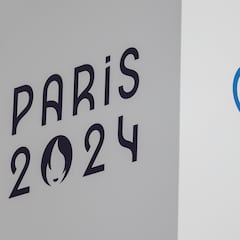Why doesn’t Team USA dip the flag at the Olympics opening ceremony?
When USA flag bearers Coco Gauff and LeBron James pass French President Emmanuel Macron during the Parade of Nations, don’t expect them to lower the colours.


During the opening ceremony of the Olympics, it is common for a country’s flag bearer to lower the flag as they pass the host nation’s head of state, as a sign of respect. For nearly a century, however, the United States has opted not to take part in this tradition - and the Americans’ 2024 flag bearers, Coco Gauff and LeBron James, aren’t expected to abandon that no-dip approach during today’s Parade of Nations.
When did US first refuse to dip the flag?
It all began at the 1908 Games in London - the first Summer Olympics at which each country’s delegation carried its national flag during an opening parade. Team USA’s flag bearer, Ralph Rose, refused to dip the American colours when he passed Britain’s King Edward VII, having allegedly declared: “This flag dips to no earthly king.” Alternative versions of the story attribute that famous quote to Rose’s team-mate, Michael Sheridan. Indeed, there appears to be plenty of doubt as to whether or not Rose, Sheridan or anybody at all actually uttered those words.
Likewise, it remains unclear what the precise motivations were for Rose’s refusal to dip the flag for the king. While the New York Times’ Ken Belson points out the general anti-royalty sentiment that gave rise to the US’s non-dipping policy, describing it as “a nod to the country’s democratic roots and rejection of monarchs”, it is possible that the reasons for the 1908 incident were more specific than that.
As Rose was Irish-American, it is widely believed that he, potentially egged on by fellow US team members of Irish heritage, was in particular eager to snub the head of the British monarchy, in a show of antipathy towards the UK. At the time, there was growing tension between the UK and Ireland - a nation that was still entirely under British rule and was pushing for autonomy. A decade after the London Olympics, the 1919-1921 Anglo-Irish War led to the partition of Ireland, with 26 southern Irish counties given independence from the UK.
No-dip policy solidified at Berlin Olympics
In the decades immediately after the 1908 Olympics, Team USA’s flag bearers alternated between dipping and not dipping; in 1912, for example, George Bonhag did lower his flag for Swedish King Gustav V at the Stockholm Olympics.
But in 1936, when the Summer Games were staged in Berlin, the US Olympic Committee ordered its flag bearers not to dip for Adolf Hitler, the dictator of Nazi Germany. “In Berlin, the tradition gets codified for the USOC,” says Professor Mark Dryeson, a sports historian at Penn State University, in a 2012 interview with the Los Angeles Times. “It’s not just the athletes doing it, now there’s an official policy. After 1936, we never dip again.”
Although France is a democratic republic - no monarchy, no dictator - French President Emmanuel Macron is unlikely to be the first head of state to receive a US flag-dip since the early decades of the modern Olympic movement. Belson’s definition of the non-dip draws attention to its repudiation of unelected heads of state and undemocratic regimes, but - by the same token - also emphasises the gesture’s apparent promotion of the power of the people over the power of an individual. In line with this philosophy, not even the presidents of America’s own monarchy-free democracy - Ronald Reagan at Los Angeles ‘84 and Bill Clinton at Atlanta ‘96 - have escaped being overlooked by US flag bearers.
Related stories
And even if exceptions had been made for Presidents Reagan and Clinton, they would technically have been illegal: for the past 82 years, the US’s refusal to lower its colours for any individual has not only been the policy of the country’s Olympic committee, but has also been enshrined in American legislation. In 1942, lawmakers in Congress cited a desire to promote “respect” for the flag when they prohibited the action of dipping the Stars and Stripes. “No disrespect should be shown to the flag of the United States of America; the flag should not be dipped to any person or thing,” the law reads.
When is the Paris 2024 opening ceremony?
The Paris Olympics’ opening ceremony is to take place today, Friday July 26, 2024. It’s scheduled to start at 1:30pm ET/10:30am PT. Viewers in the US will be able to watch the event on NBC, Telemundo and Peacock. English-language coverage will begin on NBC and Peacock at 12 noon ET/9am PT, while Telemundo’s Spanish-language broadcast will get going at 1pm ET/10am PT.


Complete your personal details to comment